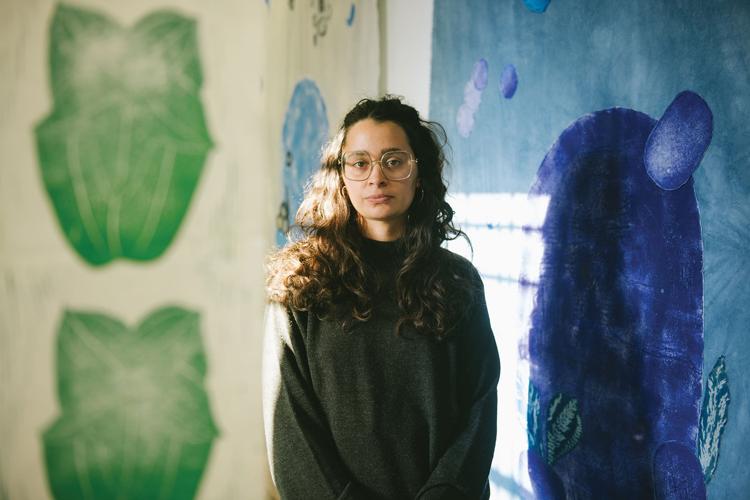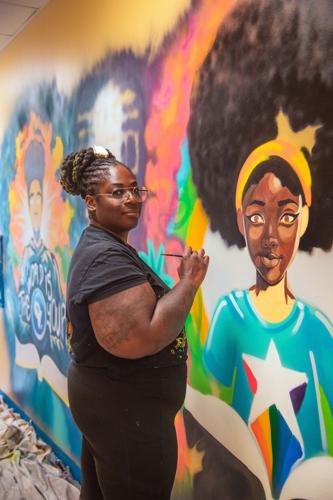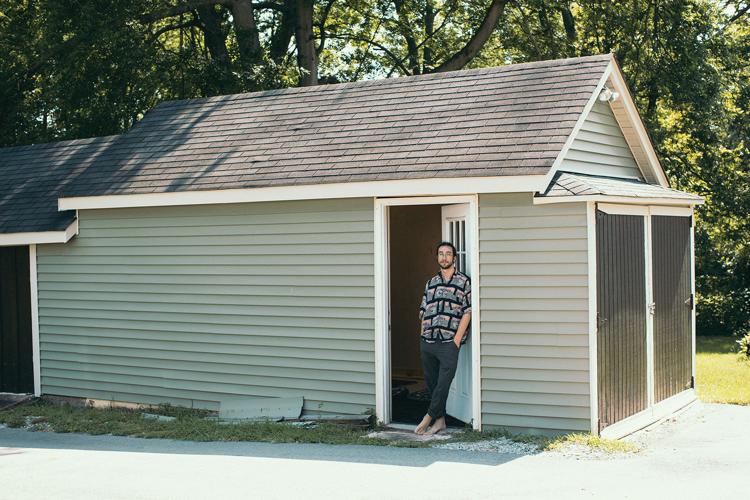
David Onri Anderson outside Electric Shed
It was only the second morning of 2024, but David Onri Anderson was already working. The lifelong Nashvillian was busy finalizing the exhibition schedule for his alternative art space Electric Shed, sending emails about a group show he was curating in Wedgewood-Houston that weekend, and getting a painting to a different group show downtown. He’d been expecting a delivery of art books that day, so he wasn’t surprised when he heard a knock at the door. But he wasn’t planning to see a government official standing in front of him, having just posted official notices on the doors of the shed behind his home.
“It was the property standards inspector, from the Metro Department of Codes and Building Safety,” he says. The issue? Electric Shed, which is an actual outdoor utility shed in Anderson’s backyard, was operating without an official permit, and the Department of Codes and Building Safety had been monitoring his Instagram and taking screenshots of his stories as evidence. The inspector told him he had six weeks to stop his exhibitions, or else there would be a $100 fee for every day he didn’t comply.
“I was just like, ‘Whoa, I’m just doing free shows for the community.’ He said, ‘It’s a cultural center — you have to get a permit.’ ”
At Nashville dinner parties and gallery openings, it’s not art-world trends or up-and-coming talent but bureaucratic interference that’s most often on the tips of artists’ tongues. The affordable studios and artist-run spaces that once made Nashville a welcoming home for artists have all but disappeared. Commercial galleries that are finally coming out from under the pandemic are still struggling to reach art collectors, and independent artists looking for government grants are competing with established organizations that have long been vital to the city’s cultural community.
In Nashville, creativity is big business. Lawyers and dentists decorate their lobbies with photos of Dolly Parton or watercolors of the Ryman to demonstrate local pride. Murals of Johnny Cash are plentiful. But getting that mentality — that the arts are the backbone of Nashville’s identity — to translate into something that’s actually useful for artists has not been easy. Nashville takes pride in its reputation as a creative capital, but its artists often can’t afford to, for instance, rent or own work and living spaces. Is there life after It City?
Above all other topics, the most talked-about conflict among local artists has been the ongoing tumult at Metro Arts. Going into the 2023-24 budget cycle, the city agency — which decides how grant money will be distributed among artists and artistic organizations — attempted to make the grant process more equitable. But that attempt also led to a confusing strategic direction and delayed funding, with the 15-seat board plagued by turnover. The situation frustrated independent artists and those who work for the organizations that depend on Metro Arts funding — from the Belcourt Theatre and the Nashville Symphony to the Nashville Children’s Theatre and Nashville Shakespeare Festival.
Artist Yanira Vissepo is in a unique position. She received grant money as an individual artist, and is also an employee of the Belcourt — which depends on Metro Arts funding. She was invited to speak at an open meeting at Metro Arts in August, but says she felt conflicted afterward.

Yanira Viseppo
“It was really frustrating, it was really upsetting, and it was also really worrying,” Vissepo tells the Scene about her experience. “I think a lot of people want change in Metro Arts, but it’s so rooted in years and years of the same, and people are scared of change. People are scared of not getting their money.
“Sure, I would love more money as an individual artist,” Vissepo says. “And yes, the Belcourt makes a lot of money, and they do have a lot of importance and influence in the community. But I think it’s fair to say that Nashville needs more public arts funding for artists, and these arts organizations like Cheekwood, the Frist, Belcourt — they kind of need to step down and do the work to find more ways to raise their funds elsewhere. It’s time for individual artists, because there’s so many of us now, and we do need more funding.”
“There’s a million reasons why grant funding is so important to individual professional artists and the orgs that work with them,” says Elisheba Israel Mrozik, another Nashville-based artist who was affected by the tumult at Metro Arts. Her nonprofit lost its operating support, and funding applications for four of her mural projects were denied. “We already don’t care enough about the arts as a literal service, as skilled labor.”

Elisheba Israel Mrozik
Still, artists remain unified on the matter of public funding for the arts — namely, that there should be more of it.
“It’s ridiculous that we’re out here fighting for these scraps,” says Mrozik, who notes her frustration that public money is going toward a new Titans stadium. She’d like to see more public investment in art. “It’s nothing in the pockets of these bigwigs who use us to make the city more playable, beautiful and enticing to the people who they want to come in and spend money.
“All the arts orgs, all the individual artists, need to come together and demand proper, consistent and permanent funding for the arts in Nashville, period.”
Among the possible bright sides of the Nashville art community’s future is the downtown Arcade, which was at one point the hub of Nashville’s art scene, and the onetime home of some of the city’s most beloved artist-run galleries. Some locals say Linfield Capital, the New York-based firm that purchased the property for $28 million in April 2021 and has since purchased several neighboring properties, has been a positive presence that has residents hopeful for a return to those glory days. Linfield’s Nashville-based investor Rob Lowe has overseen the update effort and worked to retain some of the Arcade’s longtime tenants.
“The good news is that the Arcade’s developer [Linfield Capital] isn’t just looking at the bottom line,” says artist and Tinney Contemporary’s gallery manager and curator Joshua Edward Bennett, whose gallery is directly across the street from the historic spot. “They realize that there is value, especially long-term, to have this cultural capital here be a draw. Especially as an alternative to the circus of Broadway, for visitors that are seeking something that’s not so party-driven.”
Among the Arcade’s tenants will be new outposts of Urban Cowboy, a bar and restaurant Bennett says will take up the first quarter of the Arcade’s first and second floors, as well as Cafe Roze.
Other bright spots Nashville’s artists highlight include newer artist-driven spaces like Random Sample. People also point to The Forge’s STATE program, which offers six artists a year apiece of free studio space, and is underwritten by partners including the Tennessee Titans. New events like Artville, as well as Metro Arts initiatives like the lending library, have been ways for artists to get paid for their work.
Another positive, according to Bennett, is Nashville’s newly elected mayor. “Freddie O’Connell is a friend of the arts,” says Bennett. “And in our district, [newly elected Metro Councilmember] Jacob Kupin has been a vocal ally. It takes people who have this elected power to actually move the dial in terms of actual municipal change, and I’m encouraged by that. There’s ample opportunity to create something quieter and more culturally different than the Redneck Riviera. I’m optimistic about the future, especially as it pertains to downtown.”
“It’s a long game,” he says. “The government could create more incentive for art-related businesses to come here. They’ve certainly done that for tech-related business and music-related businesses, and that’s obviously working because those businesses are very much a part of the fabric of the economy here.”
It’s valuable to pay attention to how Nashville-based artists fare outside their hometown, and use that as a barometer for what might be possible here given the kinds of incentives Bennett imagines.
“I see Nashville artists branch out more, and when they do, it goes well,” says David Onri Anderson, noting the publicity around Emily Weiner’s booth with Red Arrow at New York’s Future Fair, and Elephant Gallery’s participation in the upcoming Outsider Art Fair in New York. Benji Anderson (David’s brother), Ash Atterberry, Don Shull and Brett Douglas Hunter will all be showcasing their work to international audiences.
“I feel like Nashville can make a mark on the world, but it needs to think about how it’s doing that more,” Anderson says.
About the parameters Metro is enforcing on the local art scene, Anderson’s takeaway is simple. “It’s a bummer, but it’s pushing me to be more radical.”
A look at the state of Nashville’s visual arts scene, along with previews of coming art, theater, dance, film and book events





